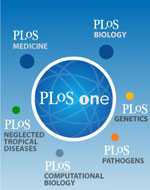PLoS ONE:发现调控体重的新基因RGS9-2
2012-01-06 MedSci原创 MedSci原创
根据美国PhysOrg网2012年1月4日报道,美国罗德岛大学药学院助理教授Abraham Kovoor一直在研究一种称作RGS9-2的脑蛋白。使用药物治疗帕金森疾病和精神分裂症时产生的副作用是病人发生无意识的、随机的和重复的身体运动。 Abraham Kovoor以前将RGS9-2与这些副作用关联在一起。 在研究这些称作运动障碍(dyskinesia)的副作用时,Kovoor发现RGS9-2在

根据美国PhysOrg网2012年1月4日报道,美国罗德岛大学药学院助理教授Abraham Kovoor一直在研究一种称作RGS9-2的脑蛋白。使用药物治疗帕金森疾病和精神分裂症时产生的副作用是病人发生无意识的、随机的和重复的身体运动。 Abraham Kovoor以前将RGS9-2与这些副作用关联在一起。
在研究这些称作运动障碍(dyskinesia)的副作用时,Kovoor发现RGS9-2在调节体重中也发挥着作用。他的研究结果发表在交互式开放存取的而且得到同行评鉴的科学和医学研究期刊《PLoS ONE》上。
Kovoor和他的合作人员发现因基因变异从而降低RGS9-2水平的人们有着显著性更高的身体质量指数(body mass index)。类似地,当他们研究RGS9-2基因缺失的小鼠品种时,因为它们不能制造RGS9-2蛋白,结果研究人员发现这些小鼠体重要比野生型小鼠品种的重,而且身体脂肪含量更加高。相反地,当在大鼠中RGS9-2蛋白过量表达时,他们发现这些大鼠体重减少。
因为RGS9-2正常情况下在大脑纹状体(striatum)---大脑中参与运动控制和奖励反应的部分---中表达,Kovoor和他的研究员认为体重增加可能是吃食物时促发的奖励反应增加的结果。
Kovoor说,因对这一发现比较吃惊,他和他的研究小组花了将近10年的时间一直在研究RGS9-2和它在药物治疗帕金森疾病和精神分裂症时产生的运动方面副作用上所发挥的影响。
事实上,Kovoor创建了Kovogen LLC公司,当前正在开发方法来预测哪些人更可能产生这些不可逆的和衰弱性的副作用以便人们能够优化药物治疗,并针对具体的病人对药物治疗进行调整。
Kovoor说,“我们给RGS9-2基因敲除的小鼠服用精神治疗药物或用于治疗帕金森疾病的药物L-DOPA,小鼠很快患上运动障碍疾病。RGS9-2提供一个研究药物如何产生这种疾病的跳板。”
事实上,受Kovoor发现的启发,他的合作人员之一Stephen Gold能够证实利用RGS9-2进行基因治疗能够抑制猴子身上药物诱导的运动障碍。
Kovoor说,“单独而言,我们一直在观察我们是否能够通过搜寻人RGS9-2基因变异来预测人们患上这些运动症状的风险敏感性。”
Kovoor和来自美国加州大学旧金山分校的研究人员在他们的研究当中还对病人的身体质量指数进行监控。“我们注意到RGS9-2基因发生变异的实验对象可能因为降低该基因的表达,因而有着更高的身体质量指数。”在小鼠和大鼠身上开展的平行实验也证实这些发现:RGS9-2参与体重调控。(生物谷:towersimper编译)
Association between Regulator of G Protein Signaling 9–2 and Body Weight
Jeffrey L. Waugh, Jeremy Celver, Meenakshi Sharma, Robert L. Dufresne, Dimitra Terzi, S. Craig Risch, William G. Fairbrother, Rachael L. Neve, John P. Kane, Mary J. Malloy, Clive R. Pullinger, Harvest F. Gu, Christos Tsatsanis, Steven P. Hamilton, Stephen J. Gold, Venetia Zachariou, Abraham Kovoor
Regulator of G protein signaling 9–2 (RGS9–2) is a protein that is highly enriched in the striatum, a brain region that mediates motivation, movement and reward responses. We identified a naturally occurring 5 nucleotide deletion polymorphism in the human RGS9 gene and found that the mean body mass index (BMI) of individuals with the deletion was significantly higher than those without. A splicing reporter minigene assay demonstrated that the deletion had the potential to significantly decrease the levels of correctly spliced RGS9 gene product. We measured the weights of rats after virally transduced overexpression of RGS9–2 or the structurally related RGS proteins, RGS7, or RGS11, in the nucleus accumbens (NAc) and observed a reduction in body weight after overexpression of RGS9–2 but not RGS7 or 11. Conversely, we found that the RGS9 knockout mice were heavier than their wild-type littermates and had significantly higher percentages of abdominal fat. The constituent adipocytes were found to have a mean cross-sectional area that was more than double that of corresponding cells from wild-type mice. However, food intake and locomotion were not significantly different between the two strains. These studies with humans, rats and mice implicate RGS9–2 as a factor in regulating body weight.
本网站所有内容来源注明为“梅斯医学”或“MedSci原创”的文字、图片和音视频资料,版权均属于梅斯医学所有。非经授权,任何媒体、网站或个人不得转载,授权转载时须注明来源为“梅斯医学”。其它来源的文章系转载文章,或“梅斯号”自媒体发布的文章,仅系出于传递更多信息之目的,本站仅负责审核内容合规,其内容不代表本站立场,本站不负责内容的准确性和版权。如果存在侵权、或不希望被转载的媒体或个人可与我们联系,我们将立即进行删除处理。
在此留言








#Plos one#
54
#新基因#
56